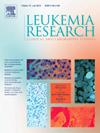骨髓增生异常综合征贫血的致病机制和靶向治疗
IF 2.2
4区 医学
Q3 HEMATOLOGY
引用次数: 0
摘要
骨髓增生异常综合征(MDS)是一种起源于造血干细胞(hsc)的髓系恶性肿瘤,其特点是造血功能低下、血细胞发育不良、转化为急性白血病的风险高。贫血影响高达90% %的MDS患者,显著增加症状负担,影响生活质量,加速疾病进展,并与发病率和死亡率增加相关。解决MDS患者贫血的治疗前景有限,这对临床管理提出了重大挑战。本文综述了MDS(包括低危MDS和高危MDS)贫血的机制,包括造血功能紊乱、端粒动力学、炎症、免疫失调、铁代谢改变以及骨髓微环境的作用。我们研究了这些因素如何促成mds相关贫血的复杂病理生理,并讨论了它们对治疗策略的影响。此外,我们强调了最近在理解MDS分子基础方面的进展,这些进展为新的治疗方法铺平了道路。这些包括针对特定基因突变的靶向治疗、免疫调节剂和刺激有效红细胞生成的创新方法。我们还回顾了新兴的治疗方法,如Luspatercept,以及其他针对特定途径的新型药物,以及正在进行的探索联合治疗和个性化治疗策略的临床试验。本文章由计算机程序翻译,如有差异,请以英文原文为准。
Pathogenic mechanisms and targeted therapies for anemia in myelodysplastic syndromes
Myelodysplastic Syndromes (MDS) are malignant neoplasms of the myeloid lineage originating from hematopoietic stem cells (HSCs), characterized by ineffective hematopoiesis, blood cell dysplasia, and a high risk of transformation to acute leukemia. Anemia affects up to 90 % of MDS patients, significantly increasing symptom burden, impacting quality of life, accelerating disease progression, and is associated with increased morbidity and mortality. The limited therapeutic landscape for addressing anemia in MDS presents a significant challenge in clinical management. This review explores the mechanisms of anemia in MDS(including low-risk MDS and high-risk MDS), covering disturbances in hematopoiesis, telomere dynamics, inflammation, immune dysregulation, alterations in iron metabolism, and the role of the bone marrow microenvironment. We examine how these factors contribute to the complex pathophysiology of MDS-related anemia and discuss their implications for treatment strategies. Furthermore, we highlight recent advances in understanding the molecular basis of MDS, which have paved the way for novel therapeutic approaches. These include targeted therapies addressing specific genetic mutations, immunomodulatory agents, and innovative approaches to stimulate effective erythropoiesis. We also review emerging treatments such as Luspatercept, along with other novel agents targeting specific pathways, and ongoing clinical trials exploring combination therapies and personalized treatment strategies.
求助全文
通过发布文献求助,成功后即可免费获取论文全文。
去求助
来源期刊

Leukemia research
医学-血液学
CiteScore
4.00
自引率
3.70%
发文量
259
审稿时长
1 months
期刊介绍:
Leukemia Research an international journal which brings comprehensive and current information to all health care professionals involved in basic and applied clinical research in hematological malignancies. The editors encourage the submission of articles relevant to hematological malignancies. The Journal scope includes reporting studies of cellular and molecular biology, genetics, immunology, epidemiology, clinical evaluation, and therapy of these diseases.
 求助内容:
求助内容: 应助结果提醒方式:
应助结果提醒方式:


